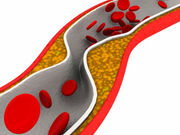Almost equivalent effects on cardiovascular events, diabetes per unit decrease in LDL-cholesterol level
FRIDAY, Dec. 2, 2016 (HealthDay News) — Variants in genes encoding proprotein convertase subtilisin-kexin type 9 (PCSK9) and 3-hydroxy-3-methylglutarylcoenzyme A reductase (HMGCR) are associated with almost equivalent effects on the risk of cardiovascular events and diabetes per unit decrease in low-density lipoprotein (LDL) cholesterol level, according to a study published in the Dec. 1 issue of the New England Journal of Medicine.
Brian A. Ference, M.D., from the Wayne State University School of Medicine in Detroit, and colleagues used genetic scores consisting of independently inherited variants in PCSK9 and HMGCR to randomize 112,772 participants from 14 studies to groups according to the number of LDL cholesterol-lowering alleles that they had inherited. The authors compared the effects of lower LDL cholesterol levels that were mediated by variants in PCSK9, HMGCR, or both.
The researchers found that per decrease of 10 mg/dL in the LDL cholesterol level, the protective effects on the risk of cardiovascular events were almost identical for variants in PCSK9 and HMGCR (odds ratios for cardiovascular events, 0.81 and 0.81, respectively). Variants in these genes also had similar effects on the risk of diabetes (odds ratios, 1.11 and 1.13, respectively). PCSK9 and HMGCR variants had additive effects on the risk of cardiovascular events and diabetes.
“In this study, variants in PCSK9 had approximately the same effect as variants in HMGCR on the risk of cardiovascular events and diabetes per unit decrease in the LDL cholesterol level,” the authors write.
Full Text (subscription or payment may be required)
Copyright © 2016 HealthDay. All rights reserved.








